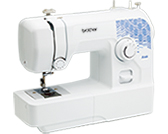JS60
FAQs & Troubleshooting |
Fabric is caught in the machine and cannot be removed
If the fabric is caught in the sewing machine and cannot be removed, the thread may have become tangled under the needle plate. Follow the procedure described below to remove the fabric from the machine.
If the operation could not be completed according to the procedure, instead of attempting to complete it forcefully, contact your nearest authorized service center.
Removing the fabric from the machine
-
Immediately stop the sewing machine.
-
Turn off the sewing machine.
-
Remove the needle.
Refer to How do I change the needle?If the needle is lowered into the fabric, turn the handwheel away from you (clockwise) to raise the needle out of the fabric, and then remove the needle.
-
Remove the presser foot and presser foot holder.
Refer to How do I remove or attach the presser foot? and How do I remove and attach the presser foot holder? -
Remove the bobbin cover.
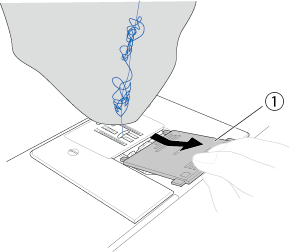
(1) Bobbin cover
-
Lift up the fabric and cut the threads below it.

Continue with the following steps to clean the race. -
Using the screwdriver, remove the two screws.
Lift up the needle plate as shown in the illustration, and then slide the needle plate to the left to remove it.
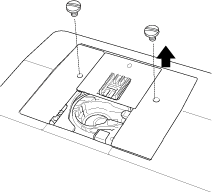
-
Cut out the tangled threads.
Grasp the bobbin case, and then lift it out to the left.

-
Use the cleaning brush or a vacuum cleaner to remove any dust from the bobbin race and its surrounding area.
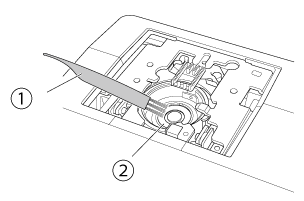
(1) Cleaning brush
(2) Race
Do not apply oil to the bobbin case.
-
Insert the bobbin case so that the
 mark on the bobbin case aligns with the
mark on the bobbin case aligns with the  mark on machine as shown below.
mark on machine as shown below.
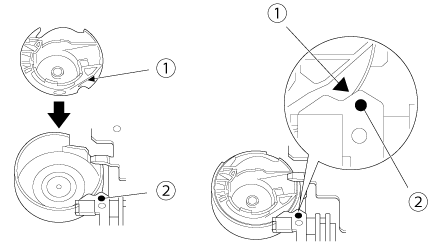
(1)
 mark
mark(2)
 mark
mark(3) Bobbin case
Align the  and
and  marks.
marks.
Make sure that the indicated points are aligned before installing the bobbin case.
-
Install the needle plate, and then tighten the screws.
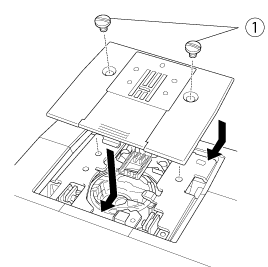
(1) Screws Make sure that you install the needle plate securely.
-
Turn the handwheel to check that the feed dogs move smoothly and do not contact the edges of the slots in the needle plate.

(1) Correct position of feed dogs
(2) Incorrect position of feed dogs
(3) Needle plate
(4) Feed dogs
-
Install the bobbin cover.

-
Check the condition of the needle, and then install it.
If the needle is in a poor condition, for example, if it is bent, be sure to install a new needle.Before using the needle, place the flat side of the needle on a flat surface and check that the distance between the needle and the flat surface is even.

(1) Flat side
(2) Needle type marking
Correct needle

(1) Flat surface
Incorrect needle
If the distance between the needle and the flat surface is not even, the needle is bent. Do not use a bent needle.

(1) Flat surface
Do not use a bent needle. Sewing with a bent needle is extremely dangerous since the needle may break while the machine is being operated.
Checking machine operations
If the needle plate has been removed, check machine operations to confirm that installation has been completed correctly.
-
Turn on the machine.
-
Select
 Straight stitch (middle or center needle position).
Straight stitch (middle or center needle position).Do not yet install the presser foot and thread.
-
Slowly turn the handwheel toward you (counterclockwise), and look from all sides to check that the needle falls at the center of the hole in the needle plate.
If the needle contacts the needle plate, remove the needle plate, and then install it again.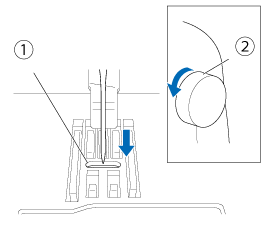
(1) Hole in the needle plate
(2) Handwheel
-
Select
 (zigzag stitch) . At this time, increase the stitch length and width to their maximum settings.
(zigzag stitch) . At this time, increase the stitch length and width to their maximum settings.
-
Slowly turn the handwheel toward you (counterclockwise) and check that the needle bar and feed dogs operate correctly.
If the needle or feed dogs contact the needle plate, the machine may be malfunctioning; therefore, contact your nearest authorized service center. -
Turn off the machine, and then install the presser foot holder and presser foot.
Refer to How do I remove or attach the presser foot holder? and How do I remove or attach the presser foot? -
Install the bobbin.
Refer to How do I install the bobbin wound with thread? -
Correctly thread the machine.
Refer to How do I thread my machine?The thread may have become tangled as a result of incorrect upper threading. Make sure that the machine is correctly threaded.
-
Perform trial sewing with normal fabric.
Incorrect sewing may be the result of incorrect upper threading or sewing thin fabrics. If there are poor results from the trial sewing, check the upper threading or the type of fabric being used.
